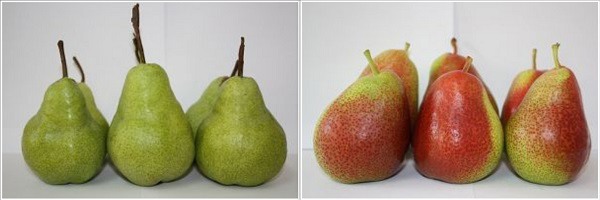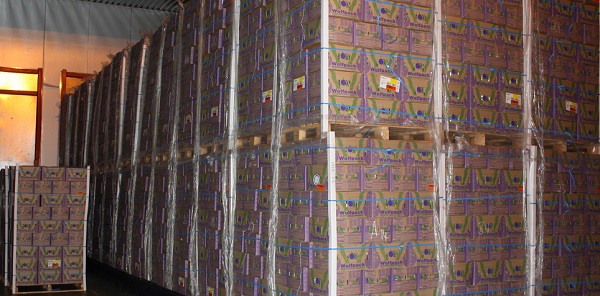Whatever chance there was of South African pears finally going to China this season, the coronavirus put paid to that, and it’s just as well: it has saved South African pear exporters from exposure to a severely disrupted market.
Their traditional markets of Europe and the Middle East are showing very little disruption, says Christo Strydom, general manager of Wolfpack Fruit Packers in Wolseley.
““What we’re seeing at the moment is that fruit is flowing, logistics are running and the market is looking for fruit. Nowhere we’re seeing a blockage because there’s no purchasing power. In fact, people have to eat, although of course this could change very quickly.”
The pear estimate for the industry is down by 4%, with the heaviest reduction in Abate Fetel, whose reduction across the Cape is set at 28% compared to last season (least in the Ceres area).
 Left: Packhams Triumph, right: Forelle (photo: Wolfpack)
Left: Packhams Triumph, right: Forelle (photo: Wolfpack)
“We’re busy packing Packhams, which is our largest variety, Abate Fetel and Forelle, exporting into June or July,” Christo says. “Those are the only varieties left in the store rooms. The summer pears like Bon Chretien [Williams or Bartlett], Rosemarie, Flamingo and Cheeky have all gone.”
They stop their pear exports before there is overlap with Northern Hemisphere volumes.

Harvest lower, but packouts better
“Quality and packouts are definitely better than last year, particularly on Packhams which have more mid-size fruit this season, giving us a more marketable sizing spread and more preferred counts. So even though the harvested crates are fewer, we can pack more export cartons and quality is better.”
The reduction is in part the result of a winter that simply starts too late. “The month of May is a critical period for the orchards to enter dormancy, it’s like November in the Northern Hemisphere – although I’ve never seen snow on the ground here in May like I’ve seen in Bologna in November. This past spring the temperature during May were too moderate, it’s not cold enough.”
Industry and govt are very pro-active
As for the risk posed by the coronavirus, which is as yet much less severe in South Africa than in Europe, Christo notes that the industry has been very pro-active. “If a packhouse had to close it would deal a heavy blow to the economy of a rural town, so we have to keep it out. I take my hat off to the measures announced by Pres Ramaphosa on Sunday, and the travel restrictions he imposed.”
He echoes the feeling that traditional items of fresh produce won’t be unduly affected by the coronavirus.
“It’s a pretty normal harvest, quality’s good, and despite the uncertainties it’s actually not looking too bad for us.”
For more information: Christo Strydom
Christo Strydom
Wolfpack, Wolseley Fruit Packers
Tel: +27 23 231 1066
Email: Christo@wolfpackpears.co.za
http://www.wolfpackpears.co.za
